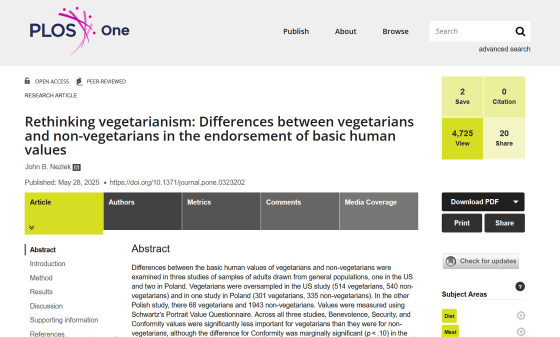Research shows that vegetarians value achievement and power more than meat eaters

Rethinking vegetarianism: Differences between vegetarians and non-vegetarians in the endorsement of basic human values | PLOS One
https://journals.plos.org/plosone/article?id=10.1371/journal.pone.0323202

Vegetarians tend to value achievement and power more than meat-eaters, study finds
https://www.psypost.org/vegetarians-tend-to-value-achievement-and-power-more-than-meat-eaters-study-finds/
While many studies have examined vegetarians' specific attitudes, such as concern for animal welfare and environmental concerns, few studies have focused on the relationship with more fundamental, abstract values. Therefore, John Nezlek, an associate professor of social psychology at SWPS University in Poland, conducted a study to examine the differences in values between vegetarians and non-vegetarians.
Previous studies have often simply identified vegetarians by their consumption of animal products. However, Nezrek points out that vegetarianism is a distinct social identity, and the identities of those who simply don't eat much meat and those who identify as vegetarians are different. Therefore, in this study, we distinguished those who simply don't eat much meat from those who identify as vegetarians as separate groups.

For his analysis, Nezlek used data from three surveys conducted in the United States and Poland. One was conducted in the United States and included 541 vegetarians and 540 non-vegetarians. The other two surveys were conducted in Poland: one included 301 vegetarians and 335 non-vegetarians, and the other included 68 vegetarians and 1,943 non-vegetarians.
The participants were asked to rate their values based on the Schwartz Value Theory proposed by social psychologist Shalom Schwartz , including power, achievement, hedonism, excitement, self-determination, universalism, philanthropy, tradition, harmony, and security. The Portrait Values Questionnaire was used to measure values, in which participants were asked to rate the degree to which various portraits resembled them.

The analysis revealed differences between vegetarians and non-vegetarians that were consistent across all three studies: vegetarians consistently rated lower values such as 'benevolence,' associated with protecting the well-being of those close to them, and 'security,' associated with safety and stability in society and relationships. Vegetarians also rated lower values of 'harmony,' associated with adhering to social expectations and refraining from deviant behavior, though this difference was only marginally significant in the American sample.
Similarly, vegetarians were less likely than non-vegetarians to endorse the value of 'tradition,' which is associated with respect and devotion to cultural or religious practices and ideas. However, while the tendency to devalue 'tradition' was evident in the Polish survey, it was not statistically significant in the American survey.
Conversely, vegetarians consistently endorsed 'excitement,' which is associated with excitement, novelty, and a desire to take on new challenges in life, and 'achievement,' which emphasizes personal success and demonstrating competence according to societal standards. Vegetarians also consistently endorsed 'power,' which is associated with social status, prestige, and control over others and resources.
The value that was evaluated differently by country was 'self-determination,' which emphasizes independent thought and action. In the United States, non-vegetarians valued 'self-determination' more than vegetarians, while in Poland, vegetarians valued 'self-determination' more than non-vegetarians.
It has also been reported that the differences in values held by vegetarians and non-vegetarians are largely unaffected by gender.

These results contradict the conventional stereotype that vegetarians are associated with values such as 'philanthropy' and 'harmony.' They suggest that vegetarians may identify with fundamental values such as 'achievement' and 'power.'
PsyPost, a psychology publication, said, 'These findings suggest that following a vegetarian diet may signal values that emphasize individuality and a willingness to stand out from the crowd. By choosing a diet that is uncommon in much of Western society, vegetarians may be demonstrating a willingness to prioritize personal beliefs over social norms.'
The data used in this study was collected at a specific point in time, so it is not possible to determine whether having certain values leads people to become vegetarians or whether practicing vegetarianism changes people's values. Also, because the subjects were limited to the United States and Poland, different results may be obtained in countries or regions where vegetarianism has a different historical or social meaning.
Related Posts:







